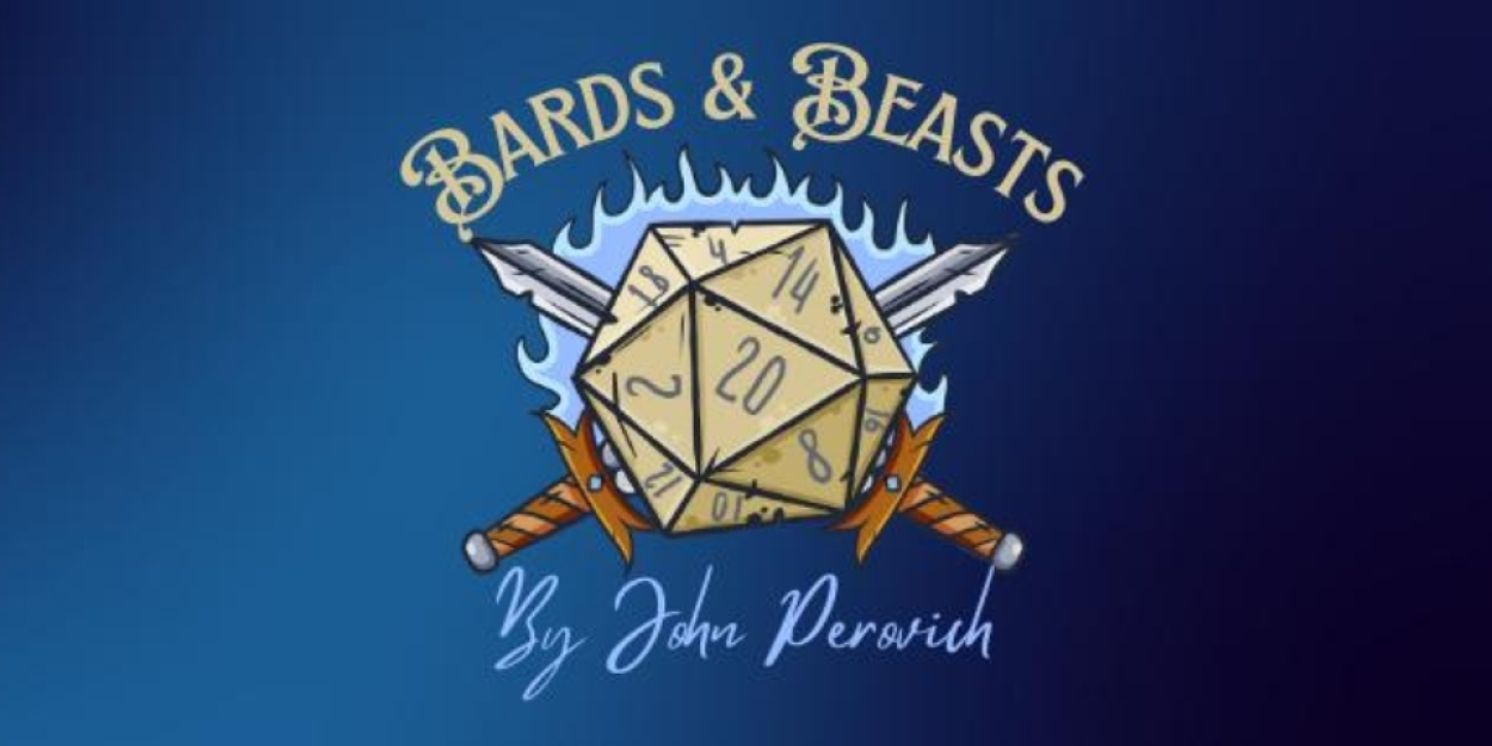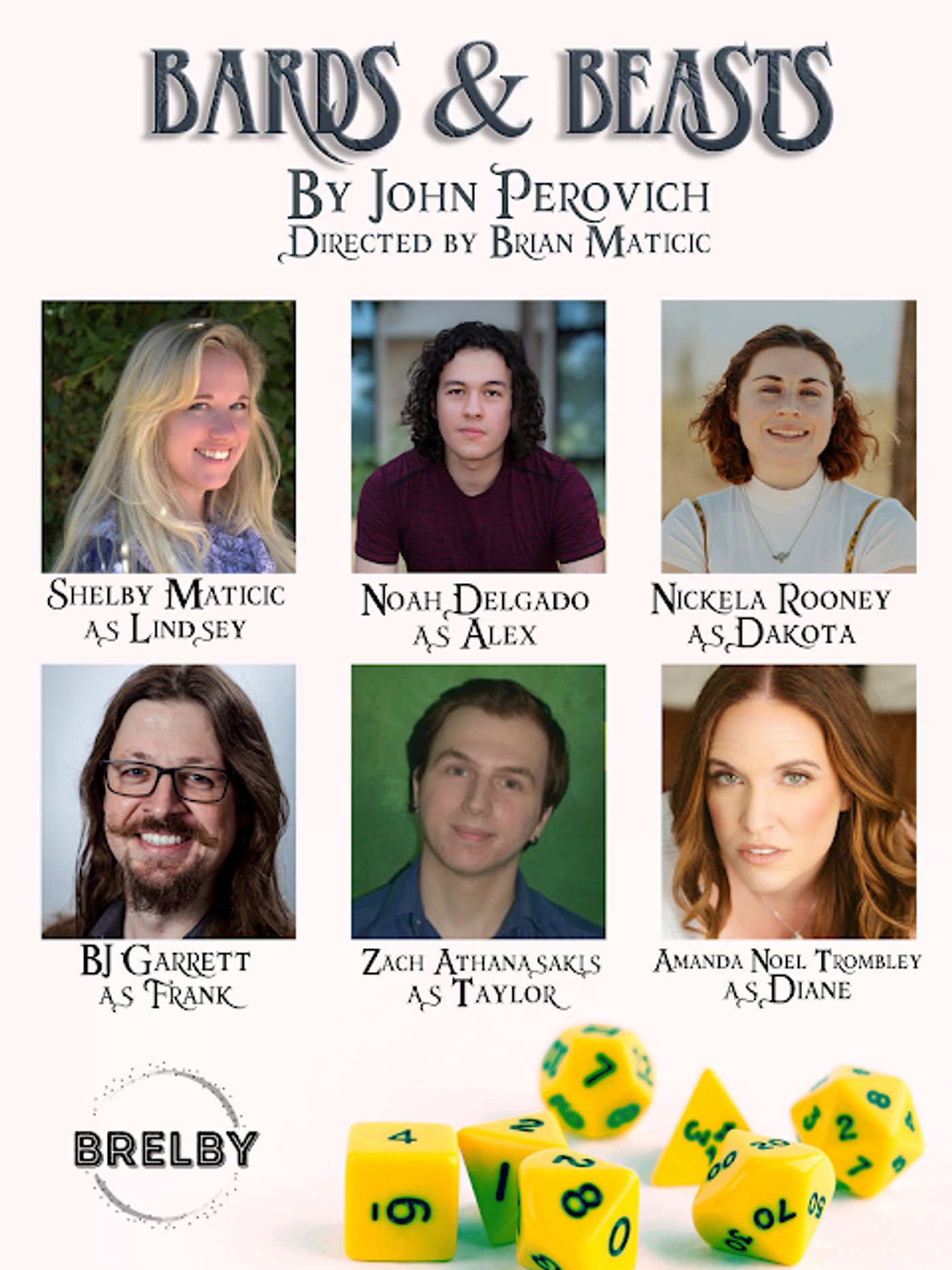Feature: BARDS AND BEASTS at Brelby Productions
Conversation with the playwright.

Do the whispers of the past, the sting of childhood, and nameless fears that stalk the night hold your heart captive? If so, John Perovich's Bards & Beasts just may be for you.
Young strangers in the creepy little town, Port Republic, find solace and friendship in the fantastical realm of Bards & Beasts, a role playing game within which lurks a darkness that casts long shadows. Two decades, a mere flicker in the cosmic dance, and buried truths claw their way to the surface. Forced to confront the fractured tapestry of their past, the grown up kids grapple with a chilling question: did their childhood sanctuary bleed into a waking nightmare, or are they haunted by phantoms of their own making?
Bards & Beasts is a story of broken bonds and enduring ties, of loss that echoes through flesh, bone and time, and the defiant courage required to face the mysteries that lie beyond the veil.
I caught up with Perovich as tech week set in leading up to B&B's April 19th opening. Between rehearsals, he took the time to answer a few questions.
JS: The tenderness of your work persists, but this piece unveils a raw wound, an intimacy that cuts to the bone. Were you conscious of this shift, or was this truth borne of the story itself?
JP: I always take my lead from the world of the play and from the characters. I knew that I wanted to focus on siblings and family — so the story became intimate…it became close connections among the characters. The story also focused on two different time periods and on loss; so, that furthered the kinds of interactions and problematic histories between everyone. There are personal details of my life — that vulnerability — throughout the piece, but it’s about these characters, their dreams and fears, and their stories.
Your work has never shied away from the shadows, but here there's something deeper, a vulnerability that lingers in tandem with the darkness. You delve into the shadowed corners of humanity, and this piece - even with a different tone - continues that journey. Tell me, what draws you to the darkness again and again – not as a spectator, but as an alchemist? Does it rise from a conscious effort, or from a place within you that speaks before the mind can censor?
It definitely feels instinctive and it’s something that I don’t quite understand about myself. I only know that I’m attracted to it as a writer and as an audience member. The darkness really came from watching movies with my Dad as a kid. I never felt like we were watching things that were too scary, but I was watching things like The 7th Voyage of Sinbad, Jason and the Argonauts, and Clash of the Titans — Ray Harryhausen. And also monster movies, vampires, Hercules: The Legendary Journeys, X-Files, Tales From the Crypt, Stephen King adaptations…all that stuff. With my Mom, too, she encouraged my love for Tim Burton. I always had an interest in darker sorts of stories — I don’t know why. As I got older, I discovered David Lynch, and his work is an endless well of wonder and inspiration. How do I strike a balance with the unsettling and the vulnerable? I don’t know. I try to have my characters be as authentic as possible — to say the thing that needs to be said, even if it is tough…even if the timing is completely wrong. Being interested in those kinds of characters while also gravitating toward science fiction, fairy tales, horror, and mythology…I don’t know. It just speaks to me.
The fantastical, while seamless, pierces the ordinary like splintered bone through flesh. How do you ensure that those elements illuminate the exposed heart of the play, rather than obscuring the raw ache that lies beneath?
It’s so easy for the fantastical to take things off the rails. For me, it starts by trying to create real characters…at least, characters who feel real, a world that feels real…and real with a capital “R” — like, it needs to be “Real.” If we’re going to be exploring more fantastical elements without them taking things over, then they need to be special, too. They need to be used sparingly, feel special, be unexpected — and they need to “pop.” They pop when they are pushing off of the “Real.” They also work well in service of the story — everything needs to serve the story. Can the fantastical be interpreted metaphorically? How does it function on a subconscious level for the audience? How does it present mystery while allowing audiences with room to dream? Those are all things that I think about while writing the fantastical in service of the play.
Frank's struggles bear the weight of the world. When you summon such darkness and guilt onto the page, what tax does it exact from you? How do you walk the tightrope between inhabiting these spaces, and preserving your own flame?
I try to tap into all of my characters — their thoughts, fears, dreams, and wants. I empathize with them, but I don’t allow myself to be consumed by them. There’s lots of imagination that’s often coupled with my personal experiences — or folks from my life. I’m thankful that it doesn’t take a personal toll and that I’m able to write as much as I do.
The ending leaves questions echoing in the silence, both unsettling and unbearably close. How does this suspension of resolution mirror the intimate truths explored throughout the play itself?
There are many times in my life when I ask, “But why?” Especially when there is hardship, cruelty, loss, and violence. The ending does leave a sense (for me) of, “But why?” and this is also the way I’ve felt after losing someone close to me — family and friends. The play thematically explores loss — what are the reasons? How does it happen? Why? My hope is that the play provides enough information and enough clarity for audience to feel satisfied with the story, but, yes, I do expect some unresolved feelings that hopefully will bear reflection and discussion after the show.
Within this play, are there moments, lines of dialogue, where you felt your own heart laid bare? What was the cost – emotional, spiritual – of writing these confessions onto the page?
There are moments when characters are being asked questions when they know that the other person knows the answer, but they aren’t getting a satisfactory response. I relate to these moments — when characters aren’t being fully truthful…when people aren’t being completely honest because they are protecting themselves, or another person, or “don’t want to get into it.” These moments feel real for me and they are personally frustrating — but I get it. I get why people equivocate. There are several of these moments throughout the play and, while not difficult to write, it’s tough to experience for the characters. Another part of my heart would be the tension between Alex and Dakota — there’s a great deal left unresolved between the two of them…and we see them try. I find their interactions heartbreaking.
The weight of existence, the fight against the absurdity of cruelty – I sense the specters of other artists in this work. Tell me, beyond the stage, who are the voices from across time and form that converse with you in the darkness?
My largest influence at the moment is H. P. Lovecraft. I’ve only recently started reading his work and I’m blown away by his writing, particularly the pieces that he wrote toward the end his life — The Dunwich Horror, At the Mountains of Madness, The Thing on the Doorstep, The Whisperer in Darkness, The Dreams in the Witch House, and others. I had tried reading his shorter pieces, but I don’t find them nearly as interesting or thought-provoking. Beyond that, I was also reading Stephen King’s On Writing during the writing of Bards & Beasts. The book is part autobiography and part a guide to writing. It’s incredible.
A lingering unease remains when the curtain falls, an echo that refuses to fade. How does this play reverberate for you, its creator? What do you carry away from it, a testament to the act of creation?
The play leaves me fearful…it leaves me wanting to know more about why things happen in the world — bad things. But it also leaves me with a sense of courage to know that we can move forward, with fear, and into the unknown.
You've wrestled intimacy and difficult truths into a story with this play. As a craftsman, a word artist, has this experience shifted how you approach the page? Do you find new strengths in your writing, or perhaps challenges you hadn't faced before?
I think the play has encouraged me to continue exploring the genre and style of this piece through new stories. I haven’t written a piece before that blends the genres of science fiction, horror, and mystery quite like Bards & Beasts. It feels familiar to me, but also new. There is another piece — an older piece — that’s on my mind during this process called The Broken Age that I’m hoping to rewrite and hopefully get produced some day. I feel like the two plays speak to each other in an intriguing way. I guess what I’m saying is that I really love the world of Bards & Beasts and I hope I can find a way to live inside of it for a bit longer.
Bards & Beasts, produced by Brelby Productions, runs April 19-21 & 26-28, 2024 at Metropolitan Arts Institute in Phoenix. Click here for tickets and information.


Videos

